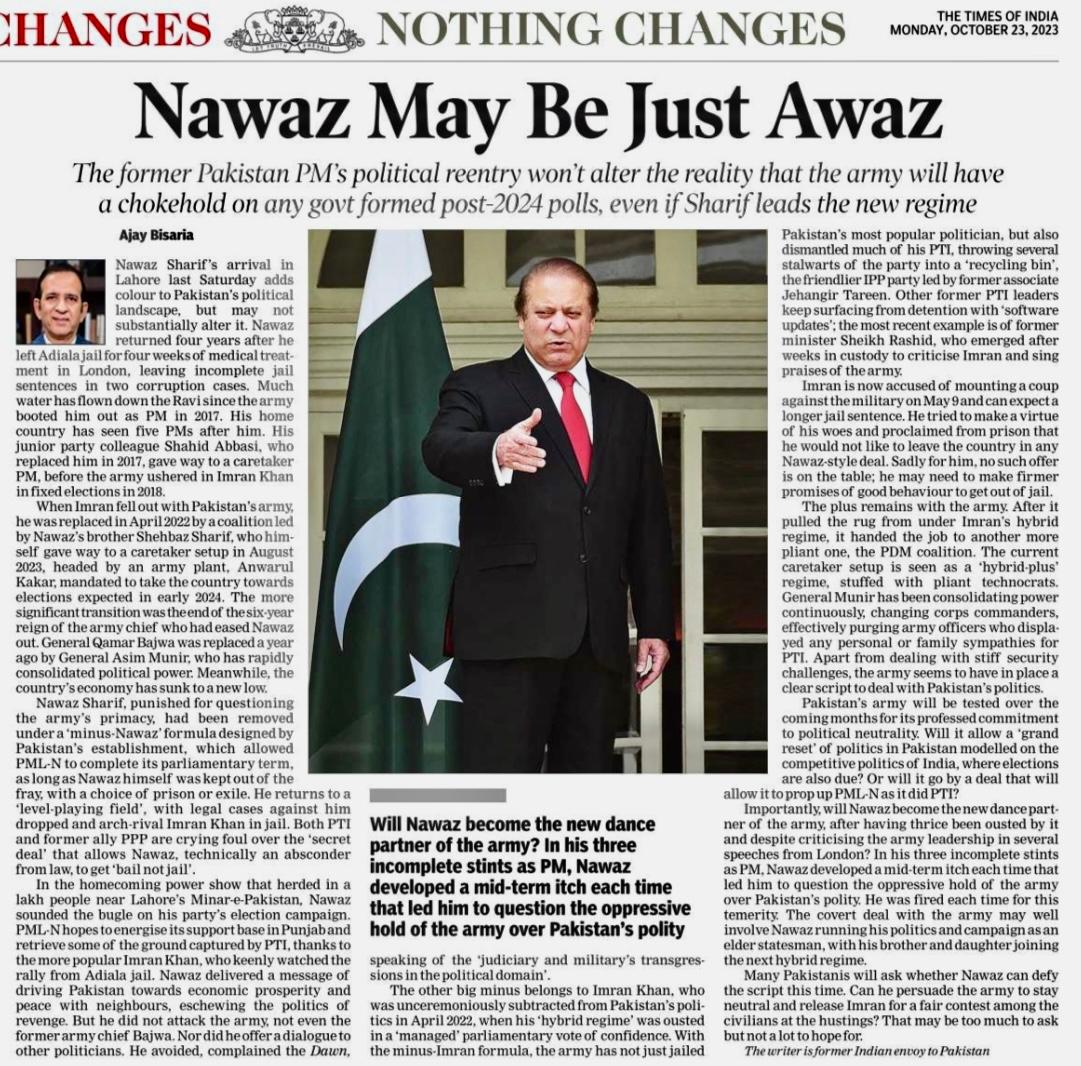Nawaz May Be Just Awaz
The former Pakistan PM’s political re-entry won’t alter the reality that the army will have a chokehold on any government formed post-2024 polls, even if Sharif leads the new regime
Nawaz Sharif’s return to Lahore on Saturday adds vibrancy to Pakistan’s political scene, but it might not bring significant change. After leaving Adiala jail for medical treatment in London four years ago, leaving behind incomplete sentences in two corruption cases, much has changed. Since the army removed him as PM in 2017, Pakistan has seen five different prime ministers. His successor, Shahid Abbasi, served briefly before a caretaker PM took over, and then Imran Khan came to power in 2018 through controversial elections. When Khan’s relationship with the army soured, he was replaced in April 2022 by a coalition led by Nawaz’s brother Shehbaz Sharif, who later handed over to a caretaker setup in August 2023, led by Anwarul Kakar, an army appointee, tasked with steering the country towards elections in early 2024. A more notable change was the end of the tenure of General Qamar Bajwa, the army chief who had ousted Nawaz. General Asim Munir, who succeeded Bajwa a year ago, has quickly consolidated political power. Meanwhile, Pakistan’s economy has hit a new low.
Nawaz Sharif, punished for questioning the army’s primacy, had been removed under a ‘minus Nawaz’ formula designed by Pakistan’s establishment, which allowed the PML-N to complete its parliamentary term, as long as Nawaz himself was kept out of the fray, with a choice of prison or exile. He returns to a ‘level playing field’, with legal cases against him dropped and arch-rival Imran Khan in jail. Both the PTI and former ally PPP are crying foul over the ‘secret deal’ that allows Nawaz, technically an absconder from law, to get ‘bail not jail’.
In the homecoming power show that herded in a lakh people near Lahore’s Minar-e-Pakistan on Saturday, Nawaz sounded the bugle on his party’s election campaign. The PML-N, hopes to energise its support base in Punjab and retrieve some of the ground captured by the PTI, thanks to the more popular Imran Khan, who keenly watched the rally from Adiala jail. Nawaz delivered a message of driving Pakistan towards economic prosperity and peace with neighbours, eschewing the politics of revenge. But he did not attack the army, not even the former army chief Bajwa. Nor did he offer a dialogue to other politicians. He avoided, complained the Dawn, speaking of the ‘judiciary and military’s transgressions in the political domain’.
The other big minus belongs to Imran Khan, who was unceremoniously subtracted from Pakistan’s politics in April 2022, when his ‘hybrid regime’ was ousted in a ‘managed’ parliamentary vote of confidence. With the minus Imran formula, the army has not just jailed Pakistan’s most popular politician, but also dismantled much of his PTI, throwing several stalwarts of the party into a ‘recycling bin’, the friendlier IPP party led by former associate Jehangir Tareen. Other former PTI leaders keep surfacing from detention with ‘software updates’; the most recent example is of former minister Sheikh Rashid, who emerged after weeks in custody to criticise Imran and sing praises of the army. Imran is now accused of mounting a coup against the military on 9 May and can expect a longer jail sentence. He tried to make a virtue of his woes and proclaimed from prison that he would not like to leave the country in any Nawaz style deal. Sadly for him, no such offer is on the table; he may need to make firmer promises of good behaviour to get out of jail.
The plus remains with the army. After it pulled the rug from under Imran’s hybrid regime, it handed the job to another more pliant one, the PDM coalition. The current caretaker setup is seen as a ‘hybrid plus’ regime, stuffed with pliant technocrats. General Munir has been consolidating power continuously, changing corps commanders, effectively purging army officers who displayed any personal or family sympathies for the PTI. Apart from dealing with stiff security challenges, the army seems to have in place a clear script to deal with Pakistan’s politics.
Pakistan’s army will be tested over the coming months for its professed commitment to political neutrality. Will it allow a ‘grand reset’ of politics in Pakistan modelled on the competitive politics of India, where elections are also due? Or will it go by a deal that will allow it to prop up the PML-N as it did the PTI.
Importantly, will Nawaz become the new dance partner of the army, after having thrice been ousted by it and despite criticising the army leadership in several speeches from London? In his three incomplete stints as PM, Nawaz developed a mid-term itch each time that led him to question the oppressive hold of the army over Pakistan’s polity. He was fired each time for this temerity. The covert deal with the army may well involve Nawaz running his politics and campaign as an elder statesman, with his brother and daughter joining the next hybrid regime.
Many Pakistanis will ask whether Nawaz can defy the script this time. Can he persuade the army to stay neutral and release Imran for a fair contest among the civilians at the hustings? That may be too much to ask but not a lot to hope for.
An edited version was first published in Times of India on October 23, 2023
